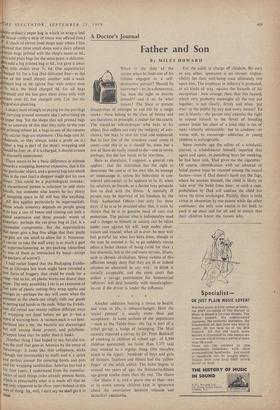A Doctor's Journal
Father and Son
By MILES
HOWARD WHAT is the duty of the citizen when he finds one of his fellows engaged in a self- destructive pursuit? Should he intervene?—or, in a democracy, has man the right to destroy himself? and if so, by what means? The State at present disapproves of attempts to end life by a single stroke—these belong to the class of felony and are therefore, in principle, a matter for the courts. The would-be self-destroyer who fails in his object thus suffers not only the indignity of anti- climax, but may be sent for trial and sentenced. But in fact few of the `overdose cases' come to court—and this is as it should be, since but a few of them do really intend to die—one in seven, perhaps; but the law needs to be rewritten.
Here as elsewhere, I suppose, a general rule applies : that the individual has the right to determine the course of his own life, to manage or mismanage it, unless his behaviour is con- sidered anti-social; or he appears to be ill, when his relatives, or friends, or a doctor may persuade him to deal with the illness. A mentally ill person may be deprived of his freedom by the Duly Authorised Officer—but only for three days; if he is to be detained after that, it must be shown that he is in genuine need of care and protection. The patient who is indisputably mad and a danger to himself or society can be taken under care against his will, kept under obser- vation and treated; when all is over, he may well feel grateful for what has been done, though at the time he resisted it. So, to go suddenly insane offers a better chance of being cared for than less dramatic, but in the end more serious, illness, such as chronic alcoholism. Many victims of this affliction simply deny that they are ill or indeed unusual or abnormal in any way : to drink is socially acceptable, and the same court that orders a savage punishment for homosexual `offences' will deal leniently with manslaughter- by-car if the driver is 'under the influence.'
Another addiction bearing a threat to health, and even to life, is tobacco-hunger. Here the 'social posture' is usually more than just acceptance : in some sections of our population —such as the Teddy-boys—the fag is part of a tribal get-up; a badge of belonging. The Mail recently reported a survey by Dr. Peter Bothwell of smoking in children of school age : of 8,300 children questioned, no fewer than 1,375 said they smoked as a regular thing. One macabre touch in the report : hundreds of boys and girls of thirteen, fourteen and fifteen had the `yellow finger' of the adult addict. The habit begins at around ten years of age; the thirteen-to-fifteen age-group smoke more than the rest. The illness —for illness it is, and a grave one at that—was at its worst among children kept in ignorance about the association between tobacco and bronchial carcinoma. For the adult in charge of children, his own or any other, ignorance is no excuse; respon- sibility for their well-being must ultimately rest upon him. The employee in industry is protected, in all kinds of way, against the hazards of his occupation : how strange, then, that this hazard, which very probably outweighs all the rest put together, is not clearly, firmly and often 'put over' to the public by any and every means? To put it bluntly—the parent may exercise the right to expose himself to the threat of breeding cancer inside his chest of a kind that is (as of now) virtually untreatable : but to condone—or worse still, to encourage—addiction in young children is unforgivable.
Some months ago the editor of a scholastic journal, a schoolmaster himself, reported that again and again, in punishing boys for smoking, he had been told, 'Dad gives me the cigarettes.' Of course, identification with an admired or hated parent must be counted among the causal factors—even if Dad doesn't hand out the fags, where he smokes himself, the child is likely to `take over' the habit from him : in such a case, prohibition by Dad will confuse the child but leave the drive unchanged. Plainly, there is little virtue in abstention by one parent while the other continues: the only sane course is for both to pack it up once and for all and to ensure that their children know the reason why.


































 Previous page
Previous page